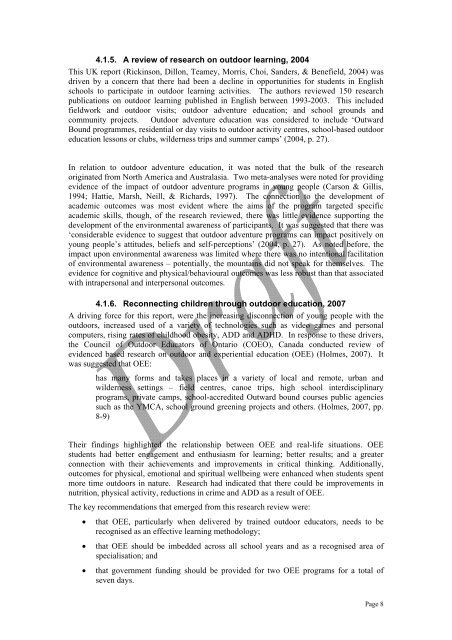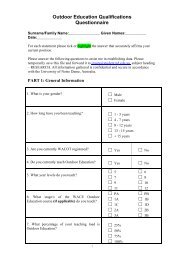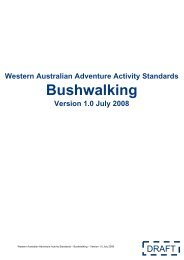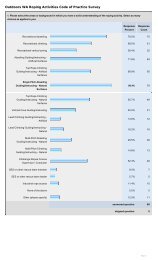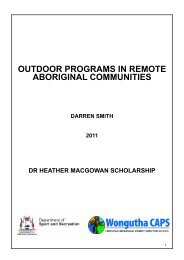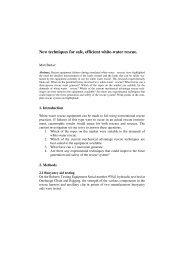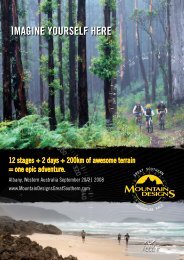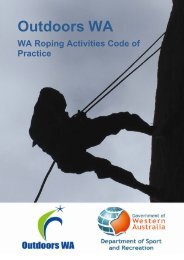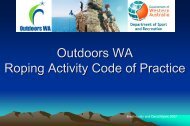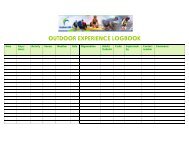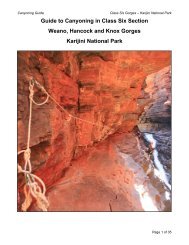Outdoor Adventure Activities Benefits Catalogue - Outdoors WA
Outdoor Adventure Activities Benefits Catalogue - Outdoors WA
Outdoor Adventure Activities Benefits Catalogue - Outdoors WA
You also want an ePaper? Increase the reach of your titles
YUMPU automatically turns print PDFs into web optimized ePapers that Google loves.
4.1.5. A review of research on outdoor learning, 2004This UK report (Rickinson, Dillon, Teamey, Morris, Choi, Sanders, & Benefield, 2004) wasdriven by a concern that there had been a decline in opportunities for students in Englishschools to participate in outdoor learning activities. The authors reviewed 150 researchpublications on outdoor learning published in English between 1993-2003. This includedfieldwork and outdoor visits; outdoor adventure education; and school grounds andcommunity projects. <strong>Outdoor</strong> adventure education was considered to include ‘OutwardBound programmes, residential or day visits to outdoor activity centres, school-based outdooreducation lessons or clubs, wilderness trips and summer camps’ (2004, p. 27).In relation to outdoor adventure education, it was noted that the bulk of the researchoriginated from North America and Australasia. Two meta-analyses were noted for providingevidence of the impact of outdoor adventure programs in young people (Carson & Gillis,1994; Hattie, Marsh, Neill, & Richards, 1997). The connection to the development ofacademic outcomes was most evident where the aims of the program targeted specificacademic skills, though, of the research reviewed, there was little evidence supporting thedevelopment of the environmental awareness of participants. It was suggested that there was‘considerable evidence to suggest that outdoor adventure programs can impact positively onyoung people’s attitudes, beliefs and self-perceptions’ (2004, p. 27). As noted before, theimpact upon environmental awareness was limited where there was no intentional facilitationof environmental awareness – potentially, the mountains did not speak for themselves. Theevidence for cognitive and physical/behavioural outcomes was less robust than that associatedwith intrapersonal and interpersonal outcomes.4.1.6. Reconnecting children through outdoor education, 2007A driving force for this report, were the increasing disconnection of young people with theoutdoors, increased used of a variety of technologies such as video games and personalcomputers, rising rates of childhood obesity, ADD and ADHD. In response to these drivers,the Council of <strong>Outdoor</strong> Educators of Ontario (COEO), Canada conducted review ofevidenced based research on outdoor and experiential education (OEE) (Holmes, 2007). Itwas suggested that OEE:has many forms and takes places in a variety of local and remote, urban andwilderness settings – field centres, canoe trips, high school interdisciplinaryprograms, private camps, school-accredited Outward bound courses public agenciessuch as the YMCA, school ground greening projects and others. (Holmes, 2007, pp.8-9)Their findings highlighted the relationship between OEE and real-life situations. OEEstudents had better engagement and enthusiasm for learning; better results; and a greaterconnection with their achievements and improvements in critical thinking. Additionally,outcomes for physical, emotional and spiritual wellbeing were enhanced when students spentmore time outdoors in nature. Research had indicated that there could be improvements innutrition, physical activity, reductions in crime and ADD as a result of OEE.The key recommendations that emerged from this research review were:• that OEE, particularly when delivered by trained outdoor educators, needs to berecognised as an effective learning methodology;• that OEE should be imbedded across all school years and as a recognised area ofspecialisation; and• that government funding should be provided for two OEE programs for a total ofseven days.Page 8


